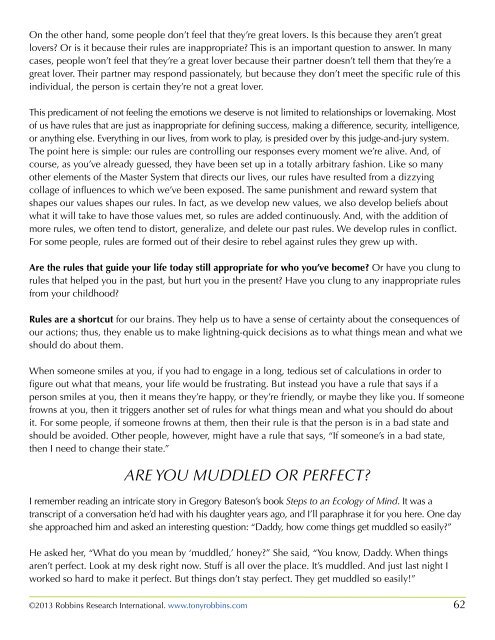Tony Robbins -Re-Awaken_the_Giant_Within
- No tags were found...
Create successful ePaper yourself
Turn your PDF publications into a flip-book with our unique Google optimized e-Paper software.
On <strong>the</strong> o<strong>the</strong>r hand, some people don’t feel that <strong>the</strong>y’re great lovers. Is this because <strong>the</strong>y aren’t great<br />
lovers? Or is it because <strong>the</strong>ir rules are inappropriate? This is an important question to answer. In many<br />
cases, people won’t feel that <strong>the</strong>y’re a great lover because <strong>the</strong>ir partner doesn’t tell <strong>the</strong>m that <strong>the</strong>y’re a<br />
great lover. Their partner may respond passionately, but because <strong>the</strong>y don’t meet <strong>the</strong> specific rule of this<br />
individual, <strong>the</strong> person is certain <strong>the</strong>y’re not a great lover.<br />
This predicament of not feeling <strong>the</strong> emotions we deserve is not limited to relationships or lovemaking. Most<br />
of us have rules that are just as inappropriate for defining success, making a difference, security, intelligence,<br />
or anything else. Everything in our lives, from work to play, is presided over by this judge-and-jury system.<br />
The point here is simple: our rules are controlling our responses every moment we’re alive. And, of<br />
course, as you’ve already guessed, <strong>the</strong>y have been set up in a totally arbitrary fashion. Like so many<br />
o<strong>the</strong>r elements of <strong>the</strong> Master System that directs our lives, our rules have resulted from a dizzying<br />
collage of influences to which we’ve been exposed. The same punishment and reward system that<br />
shapes our values shapes our rules. In fact, as we develop new values, we also develop beliefs about<br />
what it will take to have those values met, so rules are added continuously. And, with <strong>the</strong> addition of<br />
more rules, we often tend to distort, generalize, and delete our past rules. We develop rules in conflict.<br />
For some people, rules are formed out of <strong>the</strong>ir desire to rebel against rules <strong>the</strong>y grew up with.<br />
Are <strong>the</strong> rules that guide your life today still appropriate for who you’ve become? Or have you clung to<br />
rules that helped you in <strong>the</strong> past, but hurt you in <strong>the</strong> present? Have you clung to any inappropriate rules<br />
from your childhood?<br />
Rules are a shortcut for our brains. They help us to have a sense of certainty about <strong>the</strong> consequences of<br />
our actions; thus, <strong>the</strong>y enable us to make lightning-quick decisions as to what things mean and what we<br />
should do about <strong>the</strong>m.<br />
When someone smiles at you, if you had to engage in a long, tedious set of calculations in order to<br />
figure out what that means, your life would be frustrating. But instead you have a rule that says if a<br />
person smiles at you, <strong>the</strong>n it means <strong>the</strong>y’re happy, or <strong>the</strong>y’re friendly, or maybe <strong>the</strong>y like you. If someone<br />
frowns at you, <strong>the</strong>n it triggers ano<strong>the</strong>r set of rules for what things mean and what you should do about<br />
it. For some people, if someone frowns at <strong>the</strong>m, <strong>the</strong>n <strong>the</strong>ir rule is that <strong>the</strong> person is in a bad state and<br />
should be avoided. O<strong>the</strong>r people, however, might have a rule that says, “If someone’s in a bad state,<br />
<strong>the</strong>n I need to change <strong>the</strong>ir state.”<br />
ARE YOU MUDDLED OR PERFECT?<br />
I remember reading an intricate story in Gregory Bateson’s book Steps to an Ecology of Mind. It was a<br />
transcript of a conversation he’d had with his daughter years ago, and I’ll paraphrase it for you here. One day<br />
she approached him and asked an interesting question: “Daddy, how come things get muddled so easily?”<br />
He asked her, “What do you mean by ‘muddled,’ honey?” She said, “You know, Daddy. When things<br />
aren’t perfect. Look at my desk right now. Stuff is all over <strong>the</strong> place. It’s muddled. And just last night I<br />
worked so hard to make it perfect. But things don’t stay perfect. They get muddled so easily!”<br />
©2013 <strong>Robbins</strong> <strong>Re</strong>search International. www.tonyrobbins.com 62


